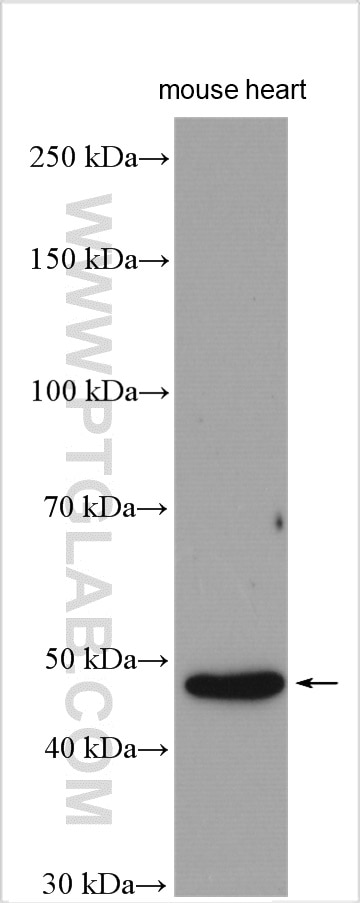ILT-3/LILRB4 Polyklonaler Antikörper
ILT-3/LILRB4 Polyklonal Antikörper für WB, ELISA
Wirt / Isotyp
Kaninchen / IgG
Getestete Reaktivität
human, Maus
Anwendung
WB, IF, ELISA
Konjugation
Unkonjugiert
Kat-Nr. : 28422-1-AP
Synonyme
Geprüfte Anwendungen
| Erfolgreiche Detektion in WB | Mauslungengewebe, Mausherzgewebe |
Empfohlene Verdünnung
| Anwendung | Verdünnung |
|---|---|
| Western Blot (WB) | WB : 1:1000-1:4000 |
| It is recommended that this reagent should be titrated in each testing system to obtain optimal results. | |
| Sample-dependent, check data in validation data gallery | |
Veröffentlichte Anwendungen
| KD/KO | See 1 publications below |
| WB | See 1 publications below |
| IF | See 1 publications below |
Produktinformation
28422-1-AP bindet in WB, IF, ELISA ILT-3/LILRB4 und zeigt Reaktivität mit human, Maus
| Getestete Reaktivität | human, Maus |
| In Publikationen genannte Reaktivität | Maus |
| Wirt / Isotyp | Kaninchen / IgG |
| Klonalität | Polyklonal |
| Typ | Antikörper |
| Immunogen | ILT-3/LILRB4 fusion protein Ag28928 |
| Vollständiger Name | leukocyte immunoglobulin-like receptor, subfamily B (with TM and ITIM domains), member 4 |
| Berechnetes Molekulargewicht | 448 aa, 49 kDa |
| Beobachtetes Molekulargewicht | 49 kDa |
| GenBank-Zugangsnummer | BC026309 |
| Gene symbol | LILRB4 |
| Gene ID (NCBI) | 11006 |
| Konjugation | Unkonjugiert |
| Form | Liquid |
| Reinigungsmethode | Antigen-Affinitätsreinigung |
| Lagerungspuffer | PBS with 0.02% sodium azide and 50% glycerol |
| Lagerungsbedingungen | Bei -20°C lagern. Nach dem Versand ein Jahr lang stabil Aliquotieren ist bei -20oC Lagerung nicht notwendig. 20ul Größen enthalten 0,1% BSA. |
Hintergrundinformationen
LILRB4 is an inhibitory receptor in the LILR family mainly expressed on normal and malignant human cells of myeloid origin. LILRB4 is activated and subsequently recruits adaptors to cytoplasmic immunoreceptor tyrosine inhibitory motifs to initiate different signaling cascades, thus playing an important role in physiological and pathological conditions, including autoimmune diseases, microbial infections, and cancers.
Protokolle
| PRODUKTSPEZIFISCHE PROTOKOLLE | |
|---|---|
| WB protocol for ILT-3/LILRB4 antibody 28422-1-AP | Protokoll herunterladen |
| STANDARD-PROTOKOLLE | |
|---|---|
| Klicken Sie hier, um unsere Standardprotokolle anzuzeigen |



